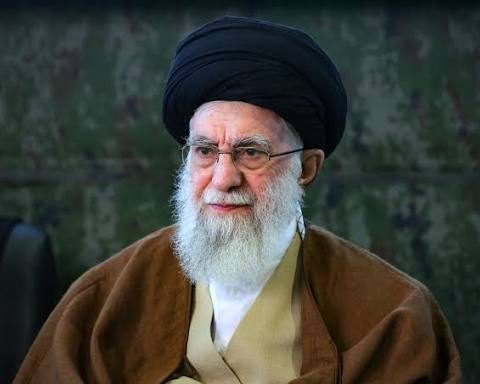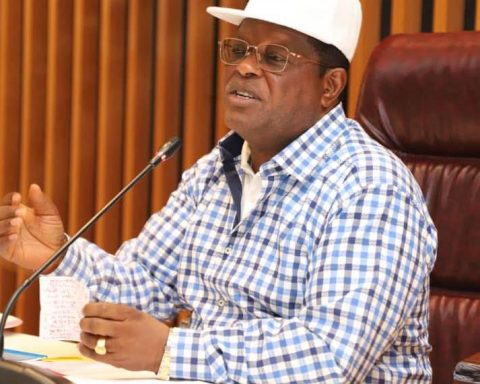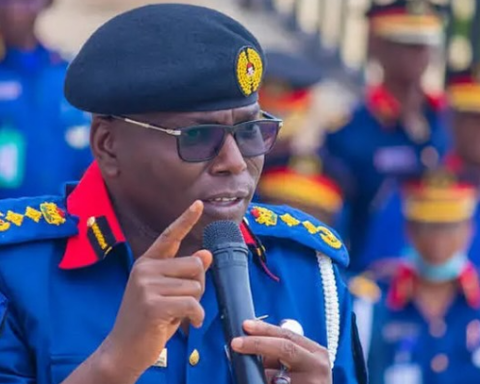Join our WhatsApp Channel
The Lagos State Government, through the Bariga Local Council Development Area (LCDA), has officially renamed the popular Charly Boy Bus Stop to Baddo Bus Stop in honour of Nigerian music star Olamide Adedeji, popularly known as Baddo. The move, intended to celebrate celebrities and influential figures associated with the Bariga community, has instead stirred significant public controversy and debate over legacy, legality, and cultural memory.
Once an organically named landmark steeped in the spirit of activism, Charly Boy Bus Stop had long been a grassroots symbol within the Bariga axis. It derived its name from Charles Oputa, widely known as Charly Boy, an eccentric entertainer and vocal rights activist who once lived in the area. Over the years, the name became embedded in the local consciousness, transcending generations and maps.
The renaming of the bus stop was part of a broader initiative by the outgoing Bariga LCDA chairman, Kolade Alabi David, to honour Nigerian talents and public figures linked to the community. Others recognised under the initiative include football star Bukayo Saka, veteran singer 9ice, and music legends like King Sunny Ade and Tony Tetuila.
However, the decision to erase the long-standing “Charly Boy” label and replace it with “Baddo” has not sat well with many residents, activists, and observers across Nigeria. Charly Boy, reacting to the development on X (formerly Twitter), remarked, “You can rename a place but you can’t rename a legacy. You can replace the signboard, but you can’t erase the spirit. Area Fada no dey finish.” His words resonated with those who view the bus stop as more than a transportation marker it is a cultural relic and symbol of resistance.
Legal and civil society voices have also weighed in. Prominent human rights lawyer, Femi Falana (SAN), condemned the renaming, calling it unconstitutional and procedurally flawed. He stressed that changes to public infrastructure names require statutory backing and public engagement, neither of which appears to have been fulfilled in this instance.
Similarly, activist and politician Omoyele Sowore described the move as “a cynical attempt to rewrite history,” likening it to previous state-led efforts to erase iconic voices. “This isn’t just about a name change,” he said. “It’s about who gets to write history, and whose memory gets erased.”
On social media, the development has divided opinion. Supporters of Olamide lauded the decision as a well-deserved tribute to a global music icon who rose from Bariga. @0lawale92 posted, “Olamide Baddo is a global brand. It’s fitting that his roots are immortalised here.” But others rejected the erasure of Charly Boy’s influence, citing past unsuccessful attempts to rename the bus stop such as the switch to “2nd Pedro” which locals ignored.
The bus stop’s transformation was marked by a celebratory unveiling and entertainment performances, but it has done little to change what locals still call the place. The new signboards now bear “Baddo Bus Stop,” but the old name continues to echo in the voices of drivers, commuters, and residents who say they were never consulted about the change.
Read also : Lagos Residents To Grapple With 25-day Blackout As TCN Embarks On Maintenance Work
The Lagos renaming controversy has now sparked wider discussions around identity, legality, and public participation. Critics argue that the process lacked transparency, while defenders say it reflects an evolving city proud of its youth-driven culture. What remains uncertain is whether the new name will truly stick, or if, like previous attempts, it will fade while Charly Boy’s legacy endures in everyday language.
In a city where names carry weight and memory, the battle over a bus stop reflects something deeper: a struggle for control over history, recognition, and the power to define place.
Amanze Chinonye is a Staff Correspondent at Prime Business Africa, a rising star in the literary world, weaving captivating stories that transport readers to the vibrant landscapes of Nigeria and the rest of Africa. With a unique voice that blends with the newspaper's tradition and style, Chinonye's writing is a masterful exploration of the human condition, delving into themes of identity, culture, and social justice. Through her words, Chinonye paints vivid portraits of everyday African life, from the bustling markets of Nigeria's Lagos to the quiet villages of South Africa's countryside . With a keen eye for detail and a deep understanding of the complexities of Nigerian society, Chinonye's writing is both a testament to the country's rich cultural heritage and a powerful call to action for a brighter future. As a writer, Chinonye is a true storyteller, using her dexterity to educate, inspire, and uplift readers around the world.
- Amanze Chinonye
- Amanze Chinonye
- Amanze Chinonye
- Amanze Chinonye
- Amanze Chinonye
- Amanze Chinonye
- Amanze Chinonye
- Amanze Chinonye
- Amanze Chinonye
- Amanze Chinonye
- Amanze Chinonye
- Amanze Chinonye
- Amanze Chinonye
- Amanze Chinonye
- Amanze Chinonye
- Amanze Chinonye
- Amanze Chinonye
- Amanze Chinonye
- Amanze Chinonye
- Amanze Chinonye
- Amanze Chinonye
- Amanze Chinonye
- Amanze Chinonye
- Amanze Chinonye
- Amanze Chinonye
- Amanze Chinonye
- Amanze Chinonye
- Amanze Chinonye
- Amanze Chinonye
- Amanze Chinonye
- Amanze Chinonye
- Amanze Chinonye
- Amanze Chinonye
- Amanze Chinonye
- Amanze Chinonye
- Amanze Chinonye
- Amanze Chinonye
- Amanze Chinonye
- Amanze Chinonye
- Amanze Chinonye
- Amanze Chinonye
- Amanze Chinonye
- Amanze Chinonye
- Amanze Chinonye
- Amanze Chinonye
- Amanze Chinonye
- Amanze Chinonye
- Amanze Chinonye
- Amanze Chinonye
- Amanze Chinonye
- Amanze Chinonye
- Amanze Chinonye
- Amanze Chinonye
- Amanze Chinonye
- Amanze Chinonye
- Amanze Chinonye
- Amanze Chinonye
- Amanze Chinonye
- Amanze Chinonye
- Amanze Chinonye
- Amanze Chinonye
- Amanze Chinonye
- Amanze Chinonye
- Amanze Chinonye
- Amanze Chinonye
- Amanze Chinonye
- Amanze Chinonye
- Amanze Chinonye
- Amanze Chinonye
- Amanze Chinonye
- Amanze Chinonye
- Amanze Chinonye
- Amanze Chinonye
- Amanze Chinonye
- Amanze Chinonye
- Amanze Chinonye
- Amanze Chinonye
- Amanze Chinonye
- Amanze Chinonye
- Amanze Chinonye
- Amanze Chinonye
- Amanze Chinonye
- Amanze Chinonye
- Amanze Chinonye
- Amanze Chinonye
- Amanze Chinonye
- Amanze Chinonye
- Amanze Chinonye
- Amanze Chinonye
- Amanze Chinonye
- Amanze Chinonye
- Amanze Chinonye
- Amanze Chinonye
- Amanze Chinonye
- Amanze Chinonye
- Amanze Chinonye
- Amanze Chinonye
- Amanze Chinonye
- Amanze Chinonye
- Amanze Chinonye
- Amanze Chinonye
- Amanze Chinonye
- Amanze Chinonye
- Amanze Chinonye
- Amanze Chinonye
- Amanze Chinonye
- Amanze Chinonye
- Amanze Chinonye
- Amanze Chinonye
- Amanze Chinonye
- Amanze Chinonye
- Amanze Chinonye
- Amanze Chinonye
- Amanze Chinonye
- Amanze Chinonye
- Amanze Chinonye
- Amanze Chinonye
- Amanze Chinonye
- Amanze Chinonye
- Amanze Chinonye
- Amanze Chinonye
- Amanze Chinonye
- Amanze Chinonye
- Amanze Chinonye
- Amanze Chinonye
- Amanze Chinonye
- Amanze Chinonye
- Amanze Chinonye
- Amanze Chinonye
- Amanze Chinonye
- Amanze Chinonye
- Amanze Chinonye
- Amanze Chinonye
- Amanze Chinonye
- Amanze Chinonye
- Amanze Chinonye
- Amanze Chinonye
- Amanze Chinonye
- Amanze Chinonye
- Amanze Chinonye















